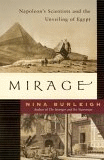Book Review: Mirage
 New York Sun
New York SunMirage by Nina Burleigh
Review by Matthew Price
Napoleon enlisted a corps of France's brightest thinkers, known as the savants. In their three-year stay, the savants would endure hardship, death, and disease as they excavated ruins and fathomed the mysteries of the Pyramids. (They unearthed the famed Rosetta Stone, the key to translating hieroglyphics, on one such expedition.) The savants mapped Cairo, as engineers tried to bring the unruly Nile under control and naturalists cataloged Egypt's teeming wildlife. Some learned Arabic (one French general took a Muslim wife, converted to Islam, and called himself Abdullah), while others lost their health — and their minds — in the harsh Egyptian clime.
Their findings were published between 1809 and 1828 in a 23-volume collection called "The Description of Egypt," itself a landmark of modern scholarship, unrivaled in the annals of 19th-century intellectual life for its staggering collation of sources and its exhaustive depiction of ancient and modern Egyptian cultures. Though the savants helped establish Egyptology as a field of inquiry, the judgment of posterity has been mixed. Edward Said sneered at the enterprise, which he called "engulfment of Egypt by the Western instruments of knowledge and power." Nina Burleigh takes a more measured tack in "Mirage" (HarperCollins, 286 pages, $25.95). For her, the savants were disinterested researchers who "tried to approach the land, the people, the relics not as tourists or literary travelers, or even colonizers, but from within their fields of scholarship." Still, her account is flawed by its avoidance of the issues about colonialism and scholarship, which are mentioned only in passing.
Ms. Burleigh is more interested in the savants themselves. Building her narrative around the lives of about a dozen of these men, she tells a lively story.
See the above page for the full review.
Mirage has also been reviewed on The Canadian Press website.
- Book Review: The Zodiac Of Paris
Bryn Mawr Classical Review (Reviewed by Patricia Johnston and Glenn Palmer) Jed Z. Buchwald, Diane Greco Josefowicz, The Zodiac of Paris: How an Improbable Controversy over an Ancient Egyptian Artifact Provoked a Modern Debate between Religion and Science....
- Exhibition: Historic Documents Reveal Ancient World
nj.com (Nicole Gough) "Egypt Unveiled" is an exhibition featuring books, artwork, maps, and resources from one of the earliest European expeditions to Egypt. "Napoleon landed in Egypt with over 50,000 troops and they were going to take over and make Egypt...
- Interview: Nina Burleigh, Author Of Mirage (audio)
The Book Guys An interview with Nina Burleigh, author of Mirage: Napoleon's Scientists and the Unveiling of Egypt, by book appraiser Allan Stypeck and Washington DC radio host Mike Cuthbert. Egyptology News Blog, Andie Byrnes...
- More On 'le Déscription' At The Dahesh
http://tinyurl.com/kxwja (nj.com) "The Dahesh Museum has a show devoted to 'Le Déscription', Napoleon on the Nile: Soldiers, Artists, and the Rediscovery of Egypt, that includes many engravings and two rare complete editions. The "Déscription"...
- Archaeology Magazine July/august
http://www.archaeology.org/0607/index.html The new edition of Archaeology is now available, and the website has been updated with some online content too, of which the following may be of interest. See the following URLs for the full accounts. Review:...
